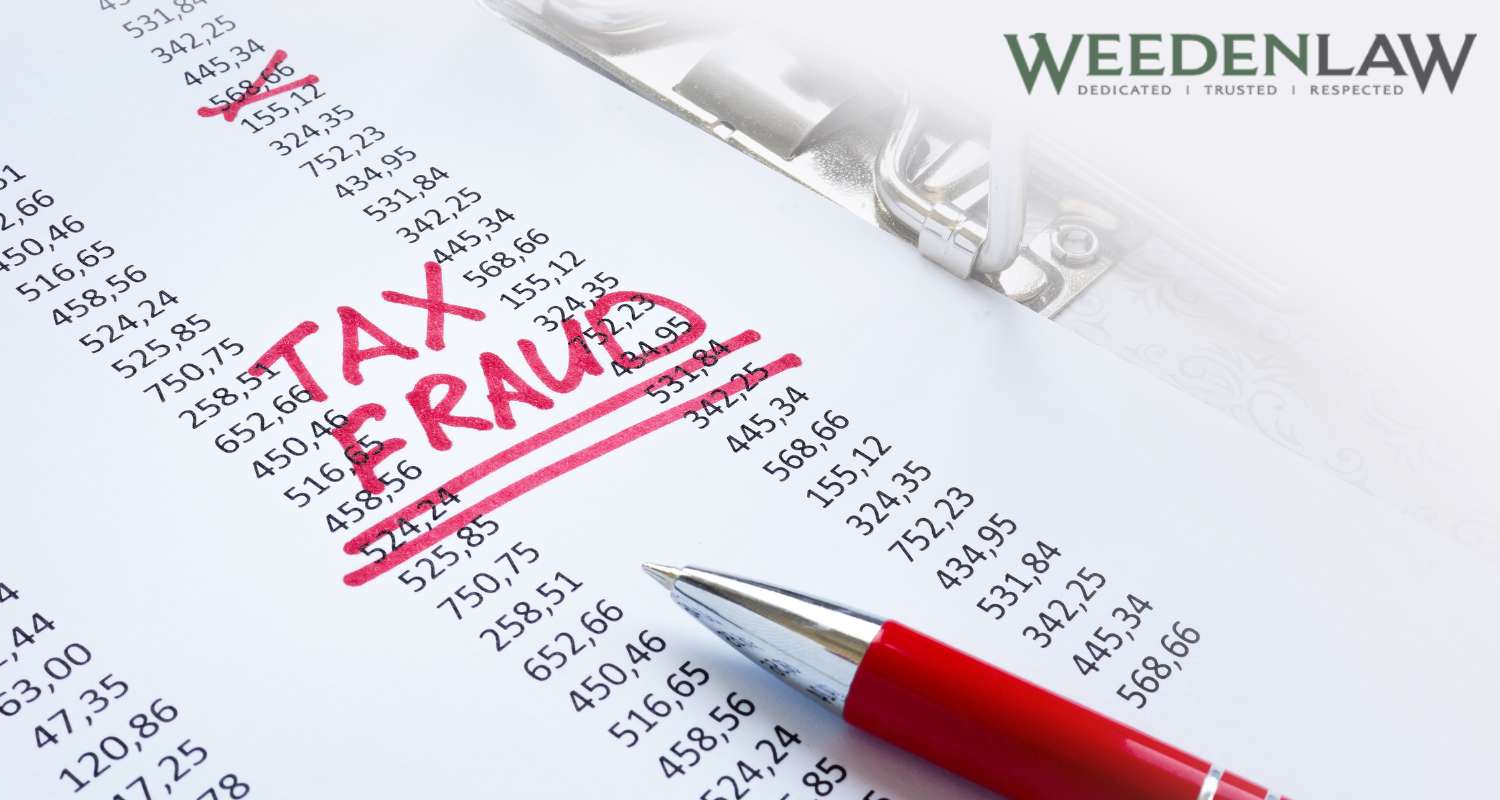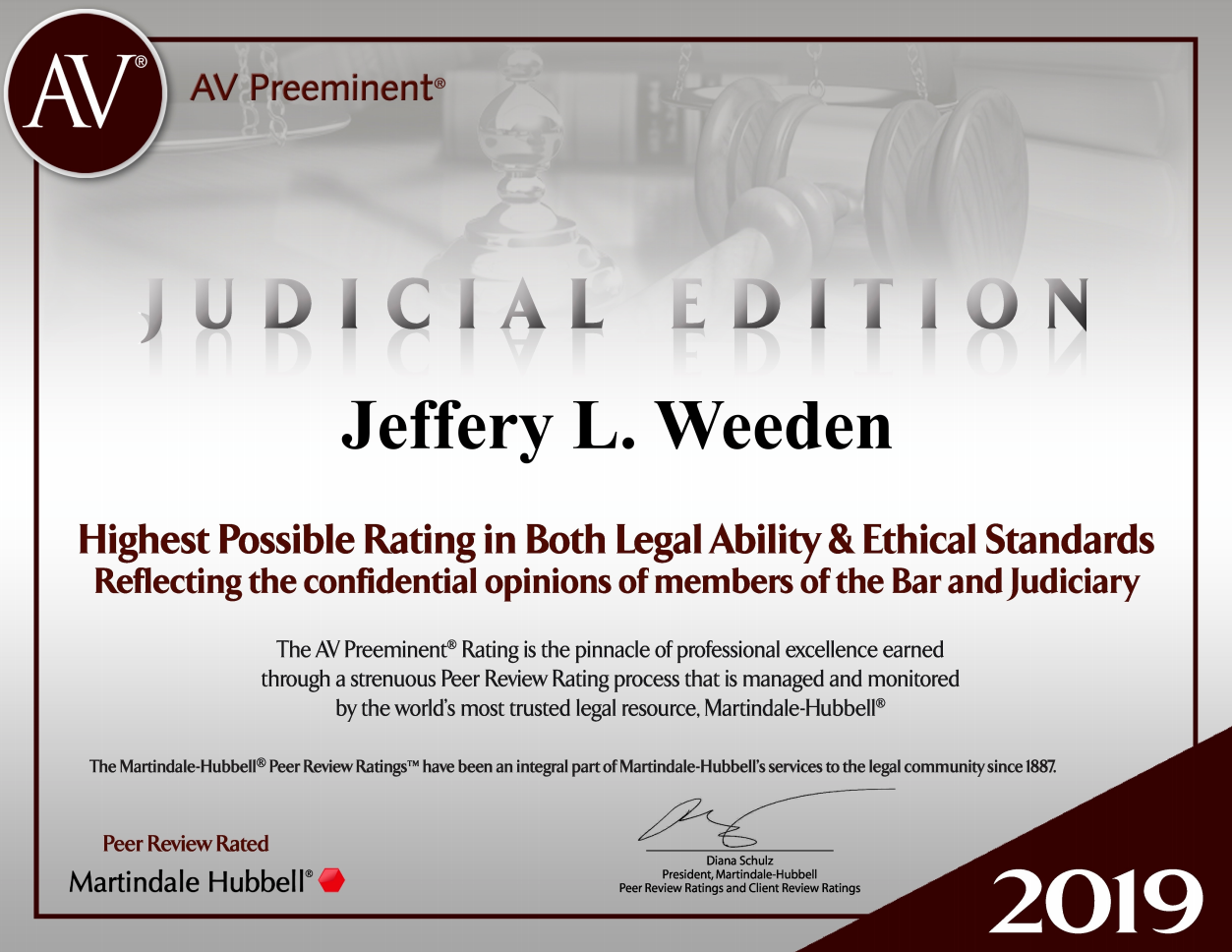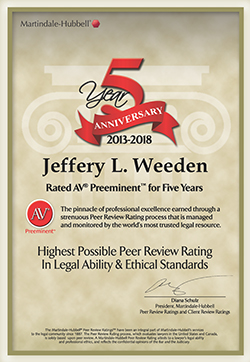Experienced Criminal Defense for Denver, Colorado Fraud Charges
Fraud is a serious criminal charge that carries severe penalties under Colorado law, including imprisonment, substantial fines, and damage to both personal and professional reputations. If you are facing fraud charges, you need an experienced Denver fraud attorney to guide you through the legal process and protect your rights.
At WeedenLaw, led by criminal defense attorney Jeff Weeden, we represent individuals accused of various types of fraud and white-collar crime charges in Denver. From insurance fraud to mail fraud to even embezzlement charges in Colorado, Denver criminal defense attorney Jeff Weeden has defended many clients against both state and federal charges, working to achieve favorable results in each fraud case he takes on.
Contact WeedenLaw to schedule a free consultation with an experienced fraud attorney in Denver who will fight to protect your rights and your future. Simply call our law office at (720) 307-4330 or complete our online contact form to learn more about how WeedenLaw can defend you against your Colorado fraud charges.

What is Fraud?
Fraud is the intentional act of deceiving another person or organization for financial gain or to cause harm. In most fraud cases, the person accused of fraud is alleged to have used false information or false representation to manipulate a situation, resulting in the victim suffering financial loss or other damage.
Fraud can take many forms, but at its core, it involves deceit and the intent to benefit unlawfully from that deceit.
There is a wide range of fraud offenses that fall under both federal and Colorado law. Common examples include identity theft, securities fraud, wire fraud, and credit card fraud. Other forms of fraud include tax fraud, bank fraud, check fraud, insurance fraud, honest services fraud, and mortgage fraud. Each type of fraud is unique, but all are taken very seriously and can result in substantial penalties for those convicted.
Types of Fraud
As we just learned, fraud offenses encompass a broad range of illegal activities, all involving deceitful practices aimed at gaining financially or causing harm to another person or organization.
Under state and federal laws, fraud charges can vary significantly depending on the nature of the crime and the type of fraud committed. From identity theft to securities fraud, these offenses often involve complex schemes that can carry severe legal consequences, including imprisonment and substantial fines.
Wire Fraud
When someone uses electronic communications, like phone calls, emails, or online platforms, to execute a fraudulent scheme, they have committed wire fraud. Since these particular fraud cases often involve interstate or international communication, they are typically prosecuted under federal law. A conviction for wire fraud can result in hefty fines and lengthy prison sentences, making it one of the most serious types of fraud charges.

Credit Card Fraud
Credit card fraud involves the unauthorized use of someone’s credit card or credit card information to make fraudulent purchases or withdraw funds. This can include stolen physical cards, compromised online data, or using counterfeit cards. Prosecuted under both state and federal statutes, credit card fraud can lead to significant penalties, especially when it involves large sums of money or organized fraud rings.
Bank Fraud
Any scheme that seeks to defraud a financial institution is considered bank fraud. These fraud cases include check fraud, false loan applications, or manipulation of financial accounts. Because bank fraud directly impacts financial systems, it is often handled in federal court.
Mortgage Fraud
When someone intentionally provides false information during the process of applying for a mortgage, refinancing a home, or modifying a loan, they have committed what’s known as mortgage fraud. This type of fraud can include inflating income, misrepresenting property values, or using false identities. Mortgage fraud can result in criminal charges and civil penalties, depending on the scope of the fraudulent activity.
Tax Fraud
Tax fraud happens when individuals or businesses intentionally lie on tax returns to avoid paying the correct amount of taxes. This can involve underreporting income, claiming false deductions, hiding assets, and tax evasion. Tax fraud is aggressively pursued by state and federal authorities, with potential penalties including fines, imprisonment, and paying back owed taxes with penalties.

Check Fraud
Check fraud involves forging or altering checks to illegally withdraw funds. This can include using someone else’s check without permission, altering check amounts, or creating counterfeit checks. Check fraud charges are treated seriously under both state and federal law, and depending on the scope of the crime, those convicted can face significant fines and prison time.
Securities Fraud
When individuals or companies deceive investors by providing false or misleading information about stocks or other investments, this is considered securities fraud. These fraud cases include insider trading, misrepresenting a company’s financial health, or manipulating market prices. Securities fraud cases are often complex and prosecuted under federal laws.
Insurance Benefits Fraud
Insurance benefits fraud involves submitting false claims to insurance companies in order to receive payouts. Common forms of this fraud include inflating property damage after an accident or even staging accidents to collect insurance money. Convictions for insurance fraud can lead to both criminal and civil penalties.

Brokerage Fraud
Brokerage fraud refers to fraudulent activities by brokers or financial advisors who mislead clients about investments for their own financial gain. This can involve unauthorized trading, providing false information about investments, or hiding the true risks involved. Brokerage fraud can lead to severe financial penalties and, for the broker, loss of professional licenses or certifications.
Investment Fraud
Investment fraud occurs when someone promises high returns on investments but has no intention of delivering them. These fraud cases often involve Ponzi schemes or other fraudulent investment operations that cheat people out of their money. Investment fraud is also prosecuted at both the state and federal levels, with heavy fines and lengthy prison sentences for those convicted.
Criminal Impersonation/Identity Theft
Criminal impersonation and identity theft are both crimes that involve assuming a false identity in order to commit fraud. More specifically, CRS § 18-5-113 defines criminal impersonation as knowingly assuming a false or fictitious identity in order to unlawfully gain a benefit for themselves or another or to injure or defraud another. The penalties for criminal impersonation in Colorado vary based on the nature of the offense and can range from a Class 2 misdemeanor to a Class 6 felony offense.
Identity theft, on the other hand, occurs when an individual knowingly uses another person’s personal or financial identifying information without permission or lawful authority, with the intent to obtain cash, credit, property, services, or any other thing of value. Under CRS § 18-5-902, identity theft may be classified a Class 2 misdemeanor or a Class 4 or 5 felony, depending on the case.
Forgery
Forgery is the act of creating, altering, or using false documents with the intent to deceive. Common types of forgery include faking signatures on contracts, altering checks, or producing counterfeit identification documents. Forgery is a serious crime that can lead to both state and federal charges, depending on the nature of the offense.
At the state level, forgery charges in Colorado are typically charged as a Class 5 felony, according to CRS § 18-5-102. If classified as second-degree forgery, however, it is downgraded to a Class 2 misdemeanor (CRS § 18-5-104).

Penalties for Fraud Convictions in Colorado
Colorado fraud charges can have serious legal consequences if they result in a conviction. The potential penalties for fraud depend on the type of fraud case, the amount of financial harm caused, and whether the case is prosecuted under state or federal law.
Fraud crimes in Colorado can result in either misdemeanor or felony charges, each carrying different levels of punishment.
Misdemeanor vs. Felony Fraud
The difference between misdemeanor and felony fraud charges depends on the amount of financial damage caused and the nature of the fraudulent activity. In Denver, misdemeanor fraud often involves smaller financial losses and may result in penalties such as fines, short-term jail sentences, or probation.
Felony fraud, on the other hand, involves larger sums of money or more elaborate schemes, often resulting in lengthy prison sentences, heavier fines, and more serious consequences. Factors such as whether the fraud crossed state lines or involved multiple victims can also elevate a fraud charge to a federal felony.
Possible Penalties for Fraud Convictions
Those convicted of misdemeanor fraud may face up to a year in jail, fines, and restitution payments to victims. Felony fraud convictions, on the other hand, can lead to prison sentences that range from several years to several decades, along with substantial fines and the obligation to repay victims.
Collateral Consequences of a Fraud Conviction
Beyond the immediate penalties of fines and imprisonment, a fraud conviction can lead to significant long-term consequences that affect nearly every aspect of a person’s life. One of the most damaging effects is the impact on a person’s reputation, which can impact both personal relationships and professional standing.
Individuals convicted of fraud may also face the revocation of professional licenses, preventing them from working in industries such as finance, law, or healthcare.
Not only that, but a fraud conviction can create serious financial limitations, as it may limit the ability to secure loans, rent housing, or obtain credit. Many employers also conduct background checks, and a criminal record for fraud can drastically reduce job opportunities, leaving individuals with fewer options for rebuilding their financial future.

Why You Need a Denver Fraud Defense Lawyer Like Jeff Weeden
Fraud cases are often highly complex, involving intricate financial documentation, multiple sources of evidence, and the need to prove intent to deceive. Because of the layers of information involved, fraud cases can be incredibly challenging without the help of experienced legal representation.
At WeedenLaw, every fraud case is guaranteed a personalized defense strategy tailored to the circumstances surrounding the fraud allegations. Denver fraud attorney Jeff Weeden has a proven track record of successfully defending clients against Colorado fraud charges, using his knowledge of state and federal laws to challenge the prosecution’s case, protect his client’s rights, and fight for the best possible outcome. He takes the time to review all financial records, witness statements, and other pieces of evidence to build a strong and aggressive defense.
From the initial investigation through trial, Attorney Weeden ensures that his client’s rights are protected at every stage of the legal process. Whether addressing state or federal fraud charges, he and his legal team work tirelessly to create a defense strategy that fits the client’s situation, aiming for the best possible resolution, be it reduced charges, dismissals, or acquittals.

Potential Defenses to Fraud Charges
When facing fraud charges in Colorado, it’s important to remember that a strong defense can significantly impact the outcome of your case. Several potential defenses can be used to challenge the prosecution’s evidence and protect your rights.
At WeedenLaw, experienced Denver fraud attorney Jeff Weeden will thoroughly evaluate your Colorado fraud case to determine the most effective defense strategy. Below are some of the more common defenses that he may explore:
- Lack of Intent: A key element of fraud is the intent to deceive. Without proof that the accused deliberately intended to deceive or cause financial harm, the prosecution may fail to meet the burden of proof. WeedenLaw can argue that there was no intent, potentially leading to a reduction or dismissal of the fraud charges.
- Insufficient Evidence: If the prosecution lacks strong or reliable evidence of fraud, the case may collapse. Denver fraud attorney Jeff Weeden will scrutinize the evidence for gaps or weaknesses, which could lead to the charges being reduced or dismissed.
- Mistaken Identity or Miscommunication: Fraud charges may stem from a miscommunication or the defendant being wrongly identified as the perpetrator. If someone else committed the fraud or if a misunderstanding occurred, WeedenLaw will work to clear you of responsibility.
- Duress or Coercion: If you were forced or manipulated into committing fraud under threats or pressure, this can serve as a valid defense and may result in the charges being dropped.
- Violation of Rights: If law enforcement violated your constitutional rights, such as through an unlawful search or seizure, any resulting evidence can be suppressed, which could lead to reduced charges or dismissal.

Facing Fraud Charges? Contact the Experienced Denver Criminal Defense Lawyers at WeedenLaw Today
If you are being investigated or facing charges for fraud in the Denver, CO area, it’s crucial to act quickly and obtain experienced legal counsel to protect your rights and future. Fortunately, Denver fraud attorney Jeff Weeden at WeedenLaw has the experience and knowledge you need to build a strong defense and protect your best interests.
To schedule a free consultation with Denver criminal defense attorney Jeff Weeden, call our law firm at (720) 307-4330 or complete our online form today.
































